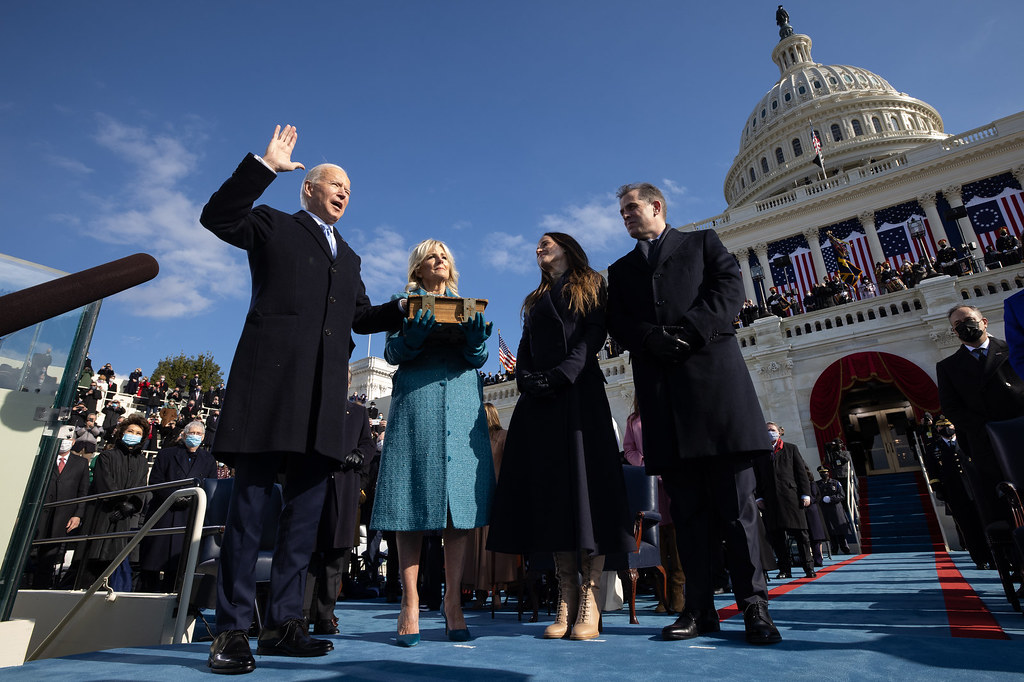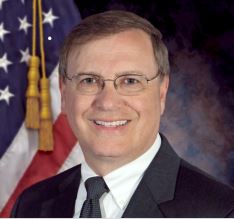Reflections on the One Year Anniversary of An Inauguration
Democracy requires acts of grace.

Published by The Lawfare Institute
in Cooperation With

The first anniversary of President Joe Biden’s inauguration is upon us. Recall that former President Donald Trump refused to ride with president-elect Biden to his January 2021 inauguration or to sit on the podium as Biden took the oath of office. Rather, Trump peevishly jetted home to Florida that morning, turning his back on Biden, on democracy, and on the nation. And all of that occurred after Trump repeatedly questioned—without any credible or reliable evidence— the results of the 2020 presidential election. Trump displayed an astonishing lack of grace.
More than two decades ago, Vice President Al Gore gave a remarkable concession speech following the bitterly contested 2000 presidential election and a contentious court battle that ended in a Supreme Court decision handing the presidency to his rival, George W. Bush. Gore must have been heartbroken. If so, he momentarily put that aside, telling the nation that:
[W]hile I strongly disagree with the court's decision, I accept it. I accept the finality of this outcome, which will be ratified next Monday in the Electoral College. And tonight, for the sake of our unity as a people and the strength of our democracy, I offer my concession. I also accept my responsibility, which I will discharge unconditionally, to honor the new president-elect and do everything possible to help him bring Americans together in fulfillment of the great vision that our Declaration of Independence defines and that our Constitution affirms and defends.
Then, as the sitting vice-president, Gore presided over the electoral vote count in Congress that certified George W. Bush as the 43rd president of the United States. That’s the same vote count that Trump tried to disrupt (by fomenting a riot) to deny the office to Biden. And, of course, Gore and President Bill Clinton attended Bush’s inauguration.
As a new federal prosecutor, I once made the mistake in a closing argument at trial of labeling a defendant a “liar.” He had repeatedly lied, so the description seemed apt. However, that sort of argument, an appellate court said (in a different case), was a mistake. It is ok to say that someone lied, but it is not ok to call them a liar. Name-calling, it turns out, is not a good idea, and it is something I have tried to avoid, in court and in life.
That makes it challenging to write and speak about former president Trump. I will comment on his behavior and not his character. And, as I think of the most offensive thing he has done in public life (also challenging) I return to his refusal to acknowledge electoral defeat.
That acknowledgment is fundamental to our nation and to our democracy. As Gore noted in his concession speech, he was simply doing what Senator Stephen A. Douglas did in 1860, when Douglas told President-Elect Abraham Lincoln after a fiercely contested election:
Partisan feeling must yield to patriotism. I'm with you, Mr. President, and God bless you.
A passage in a wonderful book by Akhil Reed Amar, “The Words That Made Us,” reminded me of Gore and Douglas. In 1787 the newly drafted Constitution was submitted to the 13 states for debate and ratification. Some states ratified quickly and unanimously: Delaware and New Jersey in December 1787; Georgia and Connecticut in January 1788. In other states, however, the sentiment was far from unanimous.
The vote for ratification in Massachusetts, for instance, was close. As Amar noted, the reaction of delegates in Massachusetts who were on the losing end of the 187-168 vote was admirable:
William Widgery declared that “he should return to his constituents and inform them that he had opposed the adoption of this Constitution; but that he had been overruled, and that it had been carried by a majority of wise and understanding men” who were “as full a representation of the people as can be convened.” Thus, he would “endeavor to sow the seeds of union and peace among the people he represented.”
And:
Major Benjamin Swift announced that despite his no vote, “many of the doubts which lay on his mind had been removed” by the deliberations and he would “support the Constitution as cheerfully and heartily as though he had voted on the other side of the question.”
And:
Doctor John Taylor said that although he had “uniformly opposed the Constitution … he found himself fairly beaten, and expressed his determination to go home and infuse a spirit of harmony and love among the people.”
Were there less magnanimous losers than these three delegates? Probably. But grace ruled the day at the 1788 Massachusetts convention. The stakes were too high for the incipient nation, as these men realized, to be other than graceful.
Relatedly, one of my favorite traditions in sport occurs at the end of the Stanley Cup finals, when the two hockey teams (one, now the champions) line up at center ice to shake hands. Having just spent two weeks battling one another, their sportsmanship is significant, including for the fact that it is newsworthy—and rare—when a player refuses to participate. Overwhelmingly, the hockey ethos is that you shake the hand of your opponent, however painful the loss.
The wretched refusal by former president Trump to acknowledge defeat and to concede, to participate in the rites of democracy, and to (literally and figuratively) shake his opponent’s hand, is dangerous.
Why? Because every presidential election in U.S. history— and virtually every other election, for that matter, at every level of government—has a winner and a loser (or multiple losers). The way those who lose elections behave (and the way those who win elections behave, too) sends important signals to the citizenry about the norms of governance. Those governance norms, of course, include elections, transitions and inaugurations. Trump deliberately undermined all three.
The rule of law – although perhaps deeply embedded in our country – is a construct. Unlike the law of gravity, which applies everywhere and always, the rule of law depends on our collective conduct and our good will as losers, as winners, when we are elated and when we are disappointed.
The rule of law can obviously sustain a couple of hits but it cannot do so consistently and forever. That is why norms and rites matter, and that includes concessions by those who lost to those who won. Trump’s petulance undermines our democracy and the peaceful transition of power, which leaders in our nation have honored, since the Constitution was ratified in 1788.
Gore got it; Douglas got it; delegates to the Massachusetts constitutional convention got it; hockey players get it. There is apparently nothing more important to Trump than Trump, including our nation and our democracy. So, no name-calling. Just a frank description of his behavior: repulsive and vile – and deeply dangerous.
Chuck Rosenberg is a former United States Attorney, senior FBI official, and head of the DEA





